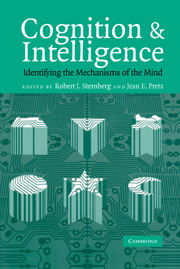Book contents
- Frontmatter
- Contents
- Preface
- 1 Information Processing and Intelligence: Where We Are and Where We Are Going
- 2 Mental Chronometry and the Unification of Differential Psychology
- 3 Reductionism versus Charting: Ways of Examining the Role of Lower-Order Cognitive Processes in Intelligence
- 4 Basic Information Processing and the Psychophysiology of Intelligence
- 5 The Neural Bases of Intelligence: A Perspective Based on Functional Neuroimaging
- 6 The Role of Working Memory in Higher-Level Cognition: Domain-Specific versus Domain-General Perspectives
- 7 Higher-Order Cognition and Intelligence
- 8 Ability Determinants of Individual Differences in Skilled Performance
- 9 Complex Problem Solving and Intelligence: Empirical Relation and Causal Direction
- 10 Intelligence as Smart Heuristics
- 11 The Role of Transferable Knowledge in Intelligence
- 12 Reasoning Abilities
- 13 Measuring Human Intelligence with Artificial Intelligence: Adaptive Item Generation
- 14 Marrying Intelligence and Cognition: A Developmental View
- 15 From Description to Explanation in Cognitive Aging
- 16 Unifying the Field: Cognition and Intelligence
- Author Index
- Subject Index
- References
Preface
Published online by Cambridge University Press: 23 November 2009
- Frontmatter
- Contents
- Preface
- 1 Information Processing and Intelligence: Where We Are and Where We Are Going
- 2 Mental Chronometry and the Unification of Differential Psychology
- 3 Reductionism versus Charting: Ways of Examining the Role of Lower-Order Cognitive Processes in Intelligence
- 4 Basic Information Processing and the Psychophysiology of Intelligence
- 5 The Neural Bases of Intelligence: A Perspective Based on Functional Neuroimaging
- 6 The Role of Working Memory in Higher-Level Cognition: Domain-Specific versus Domain-General Perspectives
- 7 Higher-Order Cognition and Intelligence
- 8 Ability Determinants of Individual Differences in Skilled Performance
- 9 Complex Problem Solving and Intelligence: Empirical Relation and Causal Direction
- 10 Intelligence as Smart Heuristics
- 11 The Role of Transferable Knowledge in Intelligence
- 12 Reasoning Abilities
- 13 Measuring Human Intelligence with Artificial Intelligence: Adaptive Item Generation
- 14 Marrying Intelligence and Cognition: A Developmental View
- 15 From Description to Explanation in Cognitive Aging
- 16 Unifying the Field: Cognition and Intelligence
- Author Index
- Subject Index
- References
Summary
COGNITION AND INTELLIGENCE
How did the study of cognition and intelligence get started? Although some psychologists in the nineteenth century were interested in cognitive processing (e.g., Donders, 1868/1869), the connection between information processing and intelligence seems first to have been explicitly drawn by Charles Spearman (1923), the same individual known for initiating serious psychometric theorizing about intelligence with his theory of the general factor of intelligence (Spearman, 1927).
Spearman (1923) proposed what he believed to be three fundamental qualitative principles of cognition. The first, apprehension of experience, is what today might be called the encoding of stimuli (see Sternberg, 1977). It involves perceiving the stimuli and their properties. The second principle, eduction of relations, is what today might be labeled inference. It is the inferring of a relation between two or more concepts. The third principle, eduction of correlates, is what today might be called application. It is the application of an inferred rule to a new situation.
Spearman was not the only early psychologist interested in the relationship between cognition and intelligence. Thorndike et al. (1926) proposed a quite similar theory based on Thorndike's theory of learning. According to this theory, learned connections are what underlie individual differences in intelligence. Some early researchers tried to integrate cognition and biology in studying intelligence. For example, the Russian psychologist Alexander Luria (1973, 1980) believed that the brain is a highly differentiated system whose parts are responsible for different aspects of a unified whole.
- Type
- Chapter
- Information
- Cognition and IntelligenceIdentifying the Mechanisms of the Mind, pp. vii - xiiPublisher: Cambridge University PressPrint publication year: 2004
References
- 1
- Cited by



